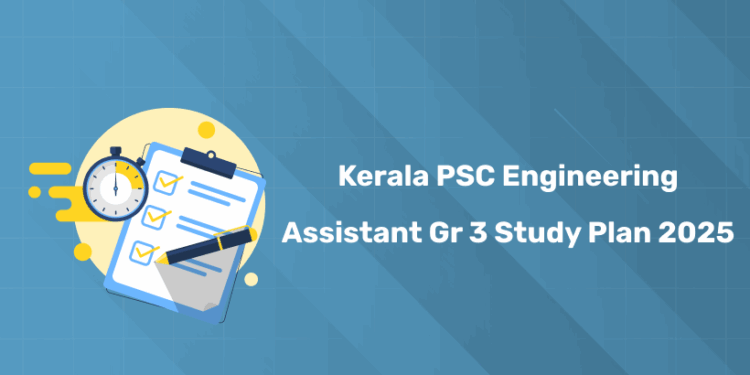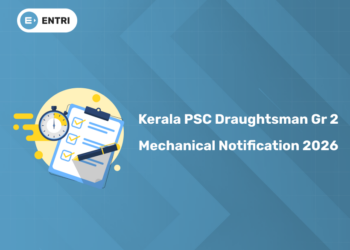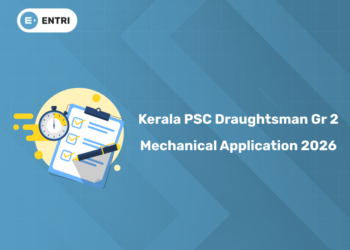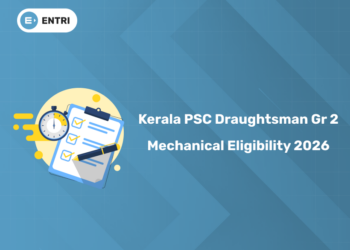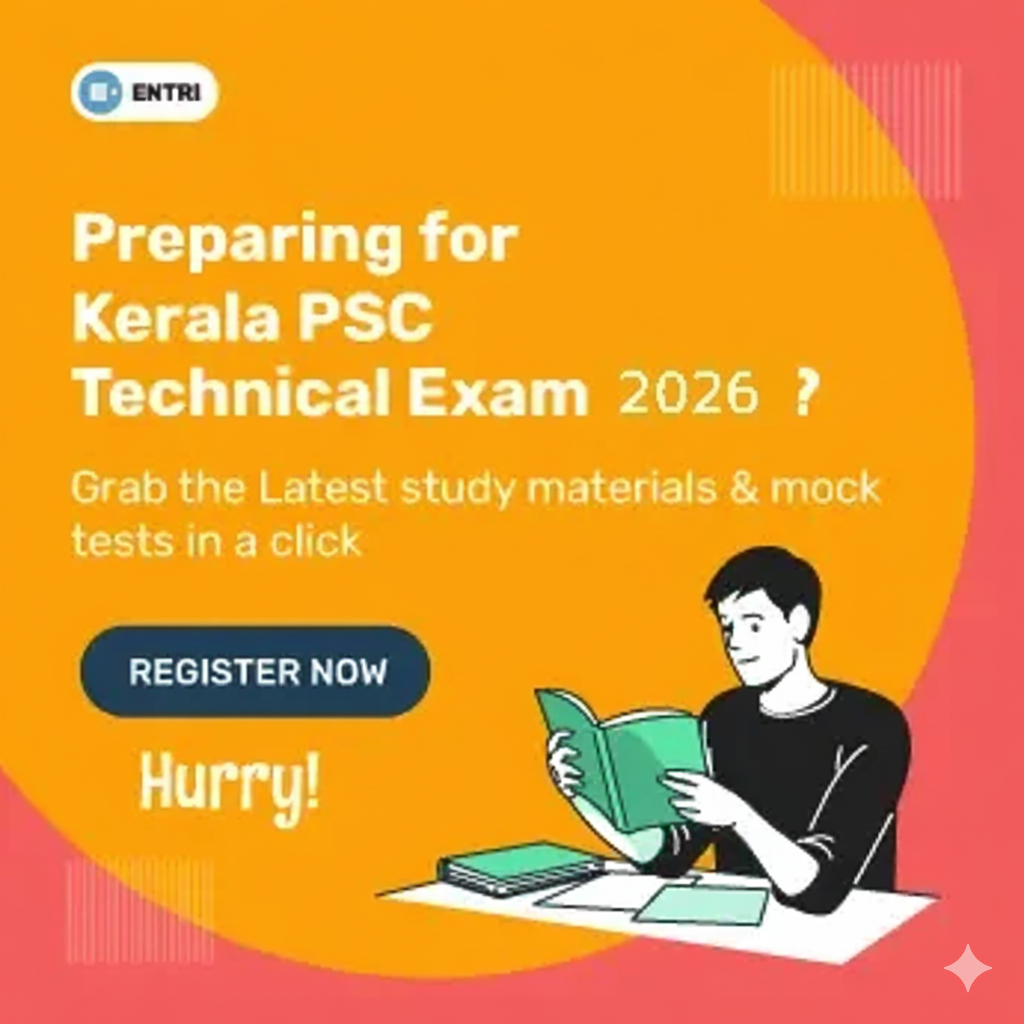Table of Contents
Kerala PSC has announced a new notification for Engineering Assistant Gr III (Category No. 223/2025) under Kerala State Construction Corporation Ltd. With the exam approaching, early preparation is essential. A well-structured study plan helps candidates cover the latest syllabus systematically, manage time effectively, and focus on important topics to maximize marks. Explore Kerala PSC Engineering Assistant Grade 3 Study Plan 2025 now!
KERALA PSC TECHNICAL EXAM COACHING
Kerala PSC Engineering Assistant Grade 3 Notification 2025 Highlights
| Event | Details |
|---|---|
| Recruiting Organization | Kerala Public Service Commission (KPSC) |
| Department | Kerala State Construction Corporation Ltd |
| Post Name | Engineering Assistant Gr III |
| Category Number | 223/2025 |
| Pay Scale | ₹ 9,190 – 15,780 /- |
| Vacancies | SC/ST – 01 (One) ST only – 02 (Two) |
| Notification Release Date | 31 July 2025 |
| Application Start Date | 31 July 2025 |
| Last Date to Apply | 03 September 2025 (up to 12:00 midnight) |
| Mode of Application | Online only (via Kerala PSC Thulasi Profile) |
| Official Webiste | www.keralapsc.gov.in |
Kerala PSC Engineering Assistant Grade 3 Syllabus 2025 PDF
1: Between the period of 1858-1947, how many Viceroys ruled over India?
Before creating an effective study plan, it is important to understand the complete syllabus. The Kerala PSC Engineering Assistant Grade 3 syllabus 2025 provides a clear outline of all the subjects, topics, and marks distribution. Reviewing the syllabus first helps identify key areas, prioritize topics, and structure a strategic plan that ensures comprehensive preparation.
| Topic | No. of Questions |
|---|---|
| AE Civil Syllabus | |
| AE Electrical Syllabus | |
| AE Mechanical Syllabus | |
| AE Electronics Syllabus | |
| AE Hydrology Syllabus |
Prepare for Kerala PSC Technical Exams with Entri
സർക്കാർ ജോലി എന്ന സ്വപ്നം ഇനി സ്വപ്നം മാത്രമല്ല! Join Kerala's Top-rated PSC Coaching Programs
Join NowKerala PSC Engineering Assistant Grade 3 Previous Question Papers 2025 – PDF
| Year | Previous Question Paper Link |
| 2016 | |
| 2015 | |
| 2019 | |
| 2014 | |
| 2021 |
Kerala PSC Engineering Assistant Grade 3 Study Plan 2025
A strategic study plan is essential for effective preparation. Below we are giving you a rough 120-day study plan based on the latest syllabus to help you cover all topics systematically and maximize your score!
Month 1: Civil Engineering Fundamentals
| Day | Topic / Focus | Remarks / Strategy |
|---|---|---|
| 1 | Mechanics of Solids: Stress & Strain, Elastic Constants | Theory + solved examples |
| 2 | Mechanics: Strain Energy, Bending Moment & Shear Force | Numerical practice |
| 3 | Torsion of Shafts, Springs | Numerical problems |
| 4 | Mohr’s Circle, Principal Stresses | Sketch & solve problems |
| 5 | Thin & Thick Cylinders, Deflection of Beams | Problem practice |
| 6 | Structural Analysis: Trusses | Method of joints & sections |
| 7 | Indeterminate Structures, Slope Deflection Method | Stepwise method practice |
| 8 | Moment Distribution, Energy Methods | Numerical problems |
| 9 | Influence Lines, Arches, Clapeyron’s Theorem | Theory + solved examples |
| 10 | Fluid Mechanics: Fluid Properties & Pressure | Theory + examples |
| 11 | Fluid Statics: Buoyancy, Hydrostatic Forces | Numerical problems |
| 12 | Fluid Dynamics: Continuity, Bernoulli, Flow Types | Numerical + theory |
| 13 | Pipe Flow, Boundary Layers | Diagrams & problems |
| 14 | Drag & Lift, Hydraulic Machines (Turbines & Pumps) | Concept clarity + problems |
| 15 | Open Channel Flow: Uniform & Gradually Varied Flow | Solve numerical problems |
| 16 | Hydrology: Hydrologic Cycle, Precipitation & Runoff | Theory + hydrograph problems |
| 17 | Irrigation: Methods, Crop Water Requirement | Practice calculations |
| 18 | Reservoir Sedimentation, River Training | Diagrams & theory |
| 19 | Groundwater: Aquifers & Well Hydraulics | Numerical practice |
| 20 | Surveying: Levelling, Contouring | Theory + field calculations |
| 21 | Surveying: Theodolite, Triangulation | Numerical examples |
| 22 | Modern Surveying: Total Station, GPS, GIS | Theory + usage |
| 23 | Quantity Surveying: Estimation & Rate Analysis | Practical examples |
| 24 | Bar Bending Schedule & Specifications | Practice problems |
| 25 | Valuation: Depreciation & Rent Fixation | Theory + numerical examples |
| 26 | Building Materials: Timber, Steel, Mortar | Theory |
| 27 | Concrete: Properties, Mix Proportioning | Numerical + theory |
| 28 | Construction Techniques: Masonry, Floors, Roofs, Arches | Diagrams + theory |
| 29 | Construction Management: Planning, Scheduling, Safety | Theory |
| 30 | Revision Day: Mechanics, Fluids, Surveying | Solve previous questions, recap formulas |
Month 2: Civil Engineering Advanced & Mechanical Engineering Basics
| Day | Topic / Focus | Remarks / Strategy |
|---|---|---|
| 31 | Design of Structures: RCC Limit State Method | Theory + examples |
| 32 | Design: Beams & Slabs | Numerical practice |
| 33 | Design: Columns, Staircases, Torsion | Numerical problems |
| 34 | Prestressed Concrete: Basics & Losses | Theory |
| 35 | Steel Structures: Tension & Compression Members | Design problems |
| 36 | Steel Structures: Beams, Roof Trusses, Purlins | Sketches + design |
| 37 | Timber Structures: Columns & Composite Beams | Theory + numerical |
| 38 | Geotechnical Engineering: Soil Properties | Theory + examples |
| 39 | Permeability, Effective Stress, Seepage | Numerical problems |
| 40 | Compaction, Consolidation, Shear Strength | Numerical practice |
| 41 | Lateral Earth Pressure, Bearing Capacity | Problems + theory |
| 42 | Foundation Settlement, Pile Foundations | Design problems |
| 43 | Geotechnical Investigations: SPT, Plate Load Test | Theory + sample calculations |
| 44 | Transportation Engineering: Highway Classification | Theory |
| 45 | Geometric Design, Alignment | Numerical + theory |
| 46 | Pavement Design: CBR Method | Problems & examples |
| 47 | Pavement Materials, Flexible & Rigid Pavements | Theory |
| 48 | Highway Drainage, Failures | Problem + diagrams |
| 49 | Urban Planning: Objectives, Zoning, Regional Planning | Theory |
| 50 | Urban Planning: Migration, Urbanization Impacts | Theory + case studies |
| 51 | Urban Planning: Town Planning Acts, Metro Regions | Theory |
| 52 | Mechanical Engineering: Statics, Equilibrium | Theory + free body diagrams |
| 53 | Mechanics: Coplanar Force Systems | Numerical examples |
| 54 | Two-Force & Three-Force Members | Numerical problems |
| 55 | Materials & Solid Mechanics: Stress-Strain, Hooke’s Law | Theory + examples |
| 56 | Materials: Elastic Constants, Biaxial & Triaxial Stress | Problems |
| 57 | Mechanics of Machines: Gears Terminology & Law of Gearing | Theory + calculations |
| 58 | Gears: Spur, Helical, Bevel, Worm | Numerical problems |
| 59 | Vibrations: Free & Forced, Damping | Theory + solved examples |
| 60 | Revision Day: Civil & Mechanical Basics | Solve questions, formulas recap |
Month 3: Mechanical & Chemical Engineering
| Day | Topic / Focus | Remarks / Strategy |
|---|---|---|
| 61 | Mechanical Engineering: Fluid Mechanics | Properties, Newtonian vs Non-Newtonian fluids |
| 62 | Fluid Mechanics: Continuity, Energy Equations | Solve problems |
| 63 | Pipe Flow & Friction Losses | Numerical practice |
| 64 | Hydraulic Machines: Turbines & Pumps | Theory + solved examples |
| 65 | Heat Transfer: Conduction (Fourier’s Law) | Steady-state conduction |
| 66 | Heat Transfer: Conduction in Walls, Cylinders, Spheres | Numerical problems |
| 67 | Critical Radius of Insulation & Heat Generation | Problem-solving |
| 68 | Industrial & Production Engineering: HR Management & Ethics | Theory |
| 69 | Production Processes: Casting (Sand, Die, Centrifugal) | Diagrams + defects |
| 70 | Machining: Turning, Milling, Grinding, Shaping, Drilling | Theory + examples |
| 71 | Welding: TIG/MIG, Machine Tool Properties | Theory + sketches |
| 72 | CNC Machining Basics & Indexing | Theory + sample calculations |
| 73 | Chemical Engineering: Particle Technology (Filtration) | Theory + operation examples |
| 74 | Particle Technology: Size Reduction & Crushers | Laws of crushing + numerical |
| 75 | Size Separation: Screens, Cyclones, Filters | Theory + calculations |
| 76 | Fluidization, Sedimentation, Froth Flotation | Numerical & theory |
| 77 | Agitation & Mixing: Equipment & Flow Patterns | Theory + examples |
| 78 | Storage & Transport of Solids, Liquids, Gases | Theory |
| 79 | Stoichiometry: Units, Dimensions, Gas Laws | Theory + problems |
| 80 | Material Balances (With & Without Reactions) | Numerical practice |
| 81 | Instrumentation: Temperature, Pressure Measurement | Theory + diagrams |
| 82 | Instrumentation: Flow, Level, Humidity, Moisture Content | Theory + solved examples |
| 83 | Process Control: Open/Closed Loop, Transducers | Theory + applications |
| 84 | Process Control: PID Controllers & Heat Exchangers | Numerical + examples |
| 85 | Mass Transfer: Diffusion, Absorption, Adsorption | Theory + Fick’s Law problems |
| 86 | Drying & Distillation (Simple, Fractional, Steam, Azeotropic) | Numerical + examples |
| 87 | Leaching (Batch & Continuous), Raoult’s Law | Problems + theory |
| 88 | Polymer Technology: Basics & Types of Polymers | Theory + applications |
| 89 | Polymer Technology: Polymerization & Copolymers | Theory + manufacturing processes |
| 90 | Revision Day: Mechanical & Chemical | Solve problems, recap key formulas |
Job-Related Topics, Revision, Mock Tests
| Day | Topic / Focus | Remarks / Strategy |
|---|---|---|
| 91 | Water Supply Engineering: Sources, Surface & Groundwater | Theory + numerical problems |
| 92 | Water Demand Estimation & Population Forecasting | Numerical practice |
| 93 | Intakes, Pumps, Pumping Stations | Theory + diagrams |
| 94 | Water Quality Standards & Analysis | Theory + sample calculations |
| 95 | Sedimentation, Coagulation, Mixing, Flocculation | Theory + numerical |
| 96 | Filtration: Slow & Rapid Sand Filters, Clariflocculators | Theory + examples |
| 97 | Distribution Systems: Layouts, Methods, Appurtenances | Numerical & theory |
| 98 | Transmission: Canals, Pipes, Transmission Mains | Theory + problem-solving |
| 99 | Disinfection Methods: Chlorination, Bleaching Powder, Electrochlorinators | Theory + calculations |
| 100 | Pump O&M: Components & Procedures | Practical + theory |
| 101 | Instrumentation, Telemetry & SCADA | Water meters, Flow & Pressure Measurement |
| 102 | Water Audit & Leakage Control | Methods, Benefits, Practical Application |
| 103 | Wastewater Engineering: Treatment Plant Layout | Screening, Aeration, Sedimentation |
| 104 | Wastewater: Primary & Secondary Treatment | Activated sludge, Trickling filters, UASB |
| 105 | Chemical Unit Processes: Precipitation, Adsorption, Disinfection | Theory + examples |
| 106 | Natural Treatment Systems: Ponds, Lagoons, Wetlands | Theory + diagrams |
| 107 | Onsite & Low-Cost Sanitation: Septic Tanks, Soak Pits | Theory + case studies |
| 108 | Sludge Management: Thickening, Digestion, Dewatering | Numerical & theory |
| 109 | Wastewater Reuse & Reclamation | Applications & Planning Considerations |
| 110 | Revision Day: Water Supply & Wastewater Engineering | Practice previous questions |
| 111 | Civil Engineering: Full Syllabus Revision | Focus on problem-solving |
| 112 | Mechanical Engineering: Full Syllabus Revision | Solve numerical & theory problems |
| 113 | Chemical Engineering: Full Syllabus Revision | Focus on key calculations & principles |
| 114 | Job-Related Topics Revision | Water, Wastewater & SCADA |
| 115 | Mock Test 1 | Full 100-mark simulation |
| 116 | Mock Test 1 Analysis | Identify weak areas & revise |
| 117 | Mock Test 2 | Full simulation |
| 118 | Mock Test 2 Analysis | Focus on mistakes & tricky questions |
| 119 | Quick Formula Revision | Civil, Mechanical & Chemical formulas |
| 120 | Final Full Syllabus Revision & Relax | Light study, focus on confidence |
Kerala PSC Engineering Assistant Grade 3 Study Strategy 2025 – Tips & Tricks
Success in the Kerala PSC Kerala PSC Engineering Assistant Grade 3 exam 2025 comes from smart planning, consistent effort, and effective revision. Here are few simple tips and tricks will help you study efficiently, remember key points, and stay confident throughout your preparation.
1. Set Up Your Daily Routine
- Morning (2–3 hours): Fresh mind → theory-heavy topics (Civil/Mechanical/Job-related concepts).
- Afternoon (2 hours): Practice numerical problems & derivations.
- Evening (1–2 hours): Revision of previous day + short quizzes.
- Consistency matters more than hours: aim for 4–5 focused sessions daily.
2. Active Learning
- Do, Don’t Just Read: Solve numerical problems immediately after studying a concept.
- Explain Out Loud: Teach the topic to yourself or a friend—it improves retention.
- Make Flashcards: For formulas, units, conversion factors, and definitions.
3. Focus on Weak Areas
- Use weekly self-assessment: end each week by identifying 2–3 weak topics.
- Spend extra time on topics that are numerically heavy (Hydraulics, heat transfer).
- Divide topics by marks weight: prioritize high-mark sections first, but don’t ignore low-mark areas.
4. Use Study Aids
-
Reference Books:
-
Civil → “Strength of Materials” by R.K. Bansal, “Fluid Mechanics” by Modi & Seth.
-
Mechanical → “Engineering Mechanics” by Beer & Johnston, “Fluid Mechanics” by White.
-
Chemical → “Unit Operations” by McCabe, “Chemical Engineering” by Geankoplis.
-
- Previous PSC Papers: Identify frequently asked questions.
- Online Lectures/YouTube: Visual explanations help in Fluid Mechanics, Heat Transfer, and Process Control.
5. Smart Problem-Solving Tricks
- Stepwise Approach: Always write knowns → unknowns → formulas → solve.
- Units First: Convert all units at the beginning to avoid errors.
- Formula Sheet: Maintain one page per subject for quick reference during revision.
6. Revision Techniques
- Daily Revision (30–45 min): Go over previous day’s notes and formulas.
- Weekly Revision (1 day): Recap 6–7 days of study.
- Monthly Revision: Solve mock tests after each month to replicate exam conditions.
- Final 2 Weeks: Focus only on revision + mock tests + tricky problems.
7. Time Management During Study
- Use the Pomodoro technique: 25–30 min focused study → 5 min break.
- Avoid multitasking; keep phone & social media away during sessions.
- Set small daily goals (e.g., “complete Mechanics of Solids numericals today”).
8. Exam-Specific Tricks
- Mark easy questions first → secure marks quickly.
- Time Management: Divide 3 hours → roughly 1 hour per major part (Civil, Mechanical, Chemical).
- Guess Smartly: Don’t leave blanks; eliminate obviously wrong options first.
- Use Shortcuts: For numerical calculations, practice approximations and mental math for common formulas.
9. Maintain Motivation & Health
- Keep a visible calendar marking completed topics—it gives satisfaction & motivation.
- Take short walks, stretch, or meditate to refresh your mind.
- Sleep 7–8 hours; tired minds cannot memorize or solve problems effectively.


